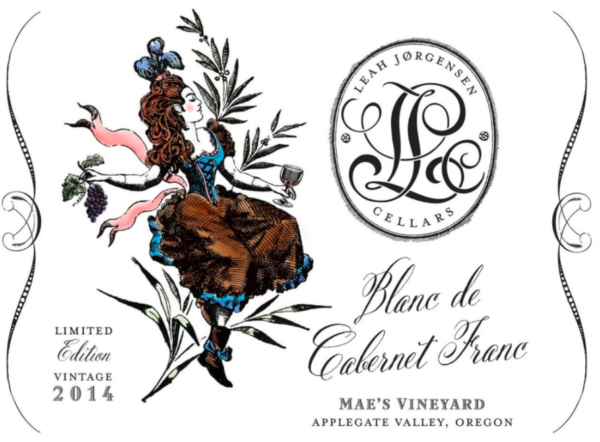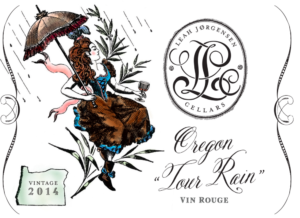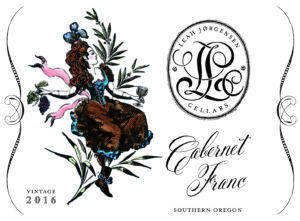
Blanc de Cabernet Franc
$1.00
| Country | USA |
|---|---|
| Region | Oregon |
| Producer | Leah Jorgensen Cellars |
| Size | 750mL |
| Style | White |
| Practices | Sustainable |
| Grapes | Cabernet Franc |
| Other Features | Vegan |
Appellation: Applegate Valley – Vineyard: Mae’s Vineyard. Located in the Applegate Valley in Southern Oregon, Mae’s Vineyard is owned and managed by Herb Quady (Quady North Wines). Planted in 2006, the vines are trained on a “V” type trellis that splits the canopy, allowing for lots of leaf area and diffracted light. The vineyard is planted 45 degrees to the east of North, giving more even light exposure during high summer, with south southeast exposure. The soil series is “Manita,” gravelly loam, granitic with red/yellow dirt. The Cabernet Franc clone is 214 on 3309 root stock. Mae’s Vineyard is LIVE Certified.
This is the first commercially produced still white wine from Cabernet Franc grapes. The fruit was gently pressed and immediately removed from the skins to avoid the influence of pigment and tannin contained in the skins. The juice settled in tank for 24 hours, then was transferred into neutral oak for barrel fermentation. The wine was transferred once more into stainless steel drums and stirred on the lees to augment the natural acidity and fruit flavors, and to add richness and a salinity to the finish. Fined with naturally sourced bentonite. Delicate nuances of “early blush” apricot, golden raspberries, Meyer lemon, blood orange, white tea leaf, tarragon, and hazelnut add to this, pretty, complex white wine from red grapes. Drink now for freshness, but this wine will age in the bottle for a couple years from the initial phenolics provided by the red skins. 90 cases made, 12.5% alcohol.
About the Producer

"Making pretty wines in the Pacific Northwest, one barrel at a time. 100% inspiré par les vins de Loire!"
Leah Jørgensen created her own interpretations of Loire style wines based on site selection, taking a close look at what the vintage is giving her. She has worked in every capacity of the wine industry (aside from vineyard management) for the past fifteen years. She began working in the Oregon wine industry in 2004, starting at Erath Vineyards in Dundee, transitioning to Ste. Michelle Wine Estates in Woodinville, WA, and returning to Oregon to work for Adelsheim Vineyard, before offering marketing consulting for a handful of wineries. At the same time, she studied enology for two years at the Northwest Viticulture Center in Salem. She worked her first full harvest at Anne Amie Vineyards in 2009, followed by two years of cellar work at Shea Wine Cellars in 2010 and 2011. She also assisted Shea winemaker Drew Voit with his Harper Voit wines both vintages, and crafted her first small lot of Cabernet Franc in 2011. In 2012, she went on to assist winemaker Tom Fitzpatrick as his sole harvest intern at Alloro Vineyard while working on her second vintage at a new winemaking facility on Beacon Hill Vineyard in Gaston.
Leah knew she wanted to make wine the moment she visited Oregon, although she initially had an inclination to ferment grape juice back when she worked at a small winery in Virginia. It took her only a decade to realize that dream. The desire to work with Oregon fruit is definitely a nod to her father’s agricultural roots, as he grew up on a small family farm outside of Eugene. Her ultimate dream is to buy that land back one day, plant a vineyard and name it after her grandparents. Leah's passion for the Loire Valley stems from her experience working for the distributor that represented Louis Dressner Selection in her hometown of Washington, DC.
Her signature, limited Blanc de Cabernet Franc is the very first commercial still white Cab Franc made. In 2012, she added the Oregon “Tour Rain” Vin Rouge, a fruity Gamay Noir/Cabernet Franc blend inspired by the Touraine region in the Loire, and a 100% “Flat Track” Cabernet Franc – Limited Roller Derby Edition, with a portion of the proceeds benefitting Portland’s Rose City Rollers league and associated charities.
Viticulture and vinification practices: many of Leah's vineyard partners are organic in practices. They are all LIVE certified and Salmon Safe. The grapes are always hand-harvested. Depending on the vintage - Leah had issue with wildfires, and with that comes the increase vulnerability for volatile phenolics and volatile acidity - cultured yeast (saccharomyces cerevisiae) might be used as they can resist to these environments. Global warming and increased heat spikes, which introduces larger colonies of spoilage bacteria from the vineyard, esp. pediococcus bacteria, are also a factor, and the only way to mitigate these issues is to inoculate, else have another microbe start and complete fermentation - which can result in an incomplete fermentation, leading to a myriad of problems. When inoculation is needed, Leah uses mostly non-GMO, naturally sourced yeast cultures. The filtration is minimal - crossflow filtration, a gentle process that removes hazardous materials (biogenic amines), leaves the colloidal materials that give a wine its texture and mouthfeel, and removes the material that masks the natural aromatic and flavor compounds that come from the grape. Adjustment for acidity depends on the vintage and site, especially in the light of global warming.
Leah Jørgensen
related products
-
Leah Jorgensen Cellars
Oregon Vin Rouge – Tour Rain
-
Leah Jorgensen Cellars
Cabernet Franc – Southern Oregon


